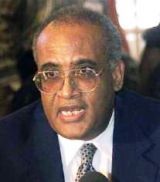AU mediators shuttle between Sudan govt, Darfur rebels
By DANIEL BALINT-KURTI
ABUJA, Nigeria, June 14, 2005 (AP) — Darfur peace talks can’t get started because the Sudanese government doesn’t want one neighbor given a role and the rebels object to another.

|
|
African Union special envoy on Darfur Salim Ahmed Salim. |
Mediators from the 53-member African Union mediators shuttled among Sudanese government officials and Darfur rebels on Tuesday to try to overcome the snag over participants hit early in the fifth round of talks on the conflict in Sudan’s western region.
The talks have made little progress since opening last week in the Nigerian capital Abuja.
The rebel Justice and Equality Movement has opposed the planned participation of Sudan’s western neighbor Chad, saying it is too close to the Sudanese authorities.
“They are peace spoilers …. We have to kick Chad out of the talks,” said Ahmed Tugod Lissan, leader of the Justice and Equality Movement’s delegation.
Chad has been a key mediator in the Darfur talks since they began last year. A Chadian embassy official said the country’s delegation would arrive in Abuja for the talks on Wednesday.
Sudan’s government, meanwhile, has objected to Eritrea being at the talks. Eritrea has sat at the two plenary sessions held so far, but Sudan says it will not accept any formal role for the nation, which it accuses of backing the rebels. Both rebel movements have offices in Eritrea.
Previous peace accords have so far failed to end conflict in Darfur that has led to at least 180,000 deaths. Around 2 million other people have fled into the bush or relief camps in Darfur or neighboring Chad.
The Darfur conflict began when mainly ethnic African rebels launched an uprising in February 2003 against what they say were decades of marginalization and neglect.
Sudan’s Arab-dominated government and pro-government Arab tribal militia are accused of launching coordinated attacks on ethnic African farmers in retaliation, causing most of the deaths and displacements.
Sudan denies targeting civilians or allying with the militia known as Janjaweed.
In the Sudanese capital, Khartoum, the special U.N. envoy on Darfur suggested Tuesday the peace talks would have more chance of success if they were not conducted in “a big public room with everybody present and many cameras.”
The U.N.’s Jan Pronk also expressed concern about what influence might be wielded by Western and African countries, calling on other countries to refrain from pushing their own interests.
The latest discussions have centered on a declaration of political principles the AU drafted after consultations with the different sides in the last round of talks.
The declaration says the unity of Sudan is of “paramount importance” but says power should be devolved to regions and the rights of people of all faiths and cultures should be respected.
It also says wealth should be distributed equitably, human rights offenders should be investigated and disputes over water resources and land ownership addressed.
In a document submitted to AU mediators, the Justice and Equality Movement has proposed the convening of a national conference aimed at more fairly distributing power — an issue at the heart of the two-year conflict.
It also says neither it nor the other rebel group at the talks — the Sudan Liberation Army — should disarm until a political accord is fully implemented, and calls for a “sizable proportion” of Sudan’s oil revenues to go towards rebuilding Darfur.
Observers said the Sudanese government’s proposed amendments were mostly to do with details of AU text’s wording. The Sudan Liberation Army says it is waiting for more of its delegates to arrive before putting together its own proposals.
